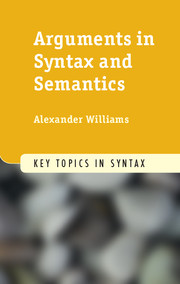13 - Resultatives
Published online by Cambridge University Press: 05 January 2015
Summary
INTRODUCTION
We have focussed on clauses whose predicate is simple, comprising no more than a verb. But a theory of argument structure must generalize to clauses whose predicate is complex, with more than one part. How do arguments then relate to the parts of the complex predicate, and how do the parts relate to each other? What we say here should be a natural extension of what we say for simple predicates. This chapter treats a test case: clauses with resultative complex predicates, like (1) or (2).
(1) Al pounded the cutlet flat.
(2) Ozzy sang his throat hoarse.
These have long been fertile pasture for theories of argument structure. The goal is to relate (1) and (2), for example, to such kindred sentences as those in (3) and (4), in terms that permit useful generalizations.
(3) a Al pounded the cutlet.
b Al flattened the cutlet.
c The cutlet was flat.
(4) a Ozzy sang Paranoid.
b Ozzy hoarsened his throat.
c Ozzy's throat was hoarse.
This will require the full battery of analytical tools reviewed in this book, and so provides a good exercise to conclude. Resultatives cast an exceptionally bright light on our most basic assumptions about argument structure and event structure, in both their semantic and syntactic aspects. Here we will bask briefly in that light. For an excellent contemporary review of the topic, see Beavers (2012).
I begin with the terms of discussion (Section 13.2), and the division of labor between Lexicon and Syntax in building resultatives (Section 13.3). I then examine the event structure of resultatives (Section 13.4), laying the foundation for the rest of the chapter. The remaining sections concern thematic relations between these events and the referents of S or O. Relations to the result event are the topic of Section 13.5, which reviews accounts of the Direct Object Restriction. Section 13.6 discusses apparent sharing of an argument, where S or O appears to name a participant in two different events.
- Type
- Chapter
- Information
- Arguments in Syntax and Semantics , pp. 307 - 334Publisher: Cambridge University PressPrint publication year: 2015

